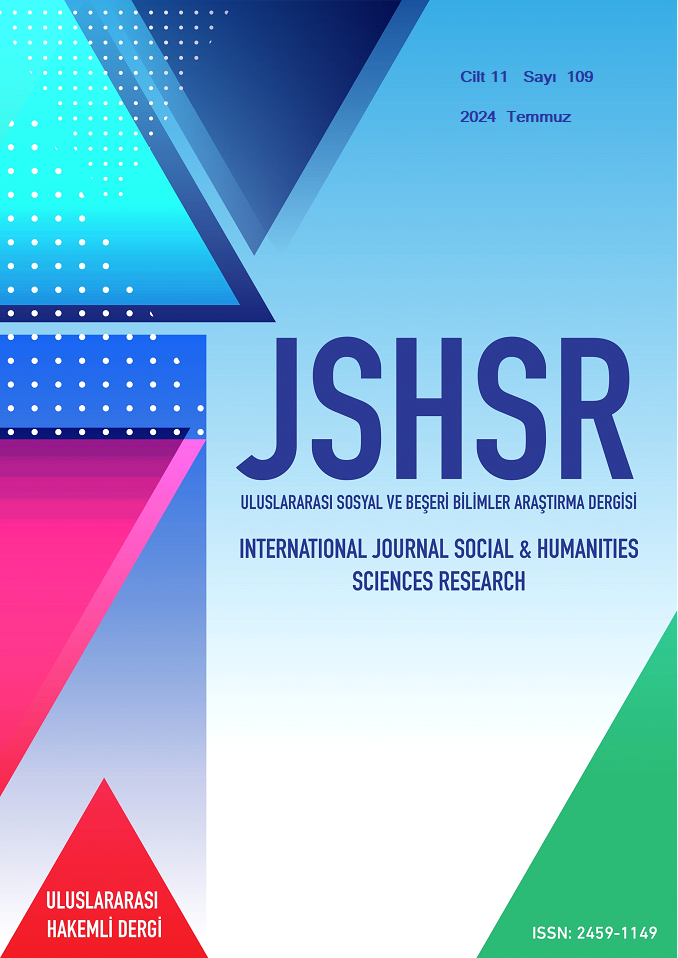Evaluation of Elementary School Third Grade Science Course Curriculum Based on Teachers’ View
DOI:
https://doi.org/10.5281/zenodo.12690516Keywords:
Curriculum Evaluation, Elementary School, Science Curriculum, Third GradeAbstract
The science and technology course that is being taught in primary schools has been updated to the name Science with the compulsory education regulation 4 + 4 + 4 (primary school 4 years + secondary school 4 years + high school 4 years) which was made in 2013 and started to be taught in the third grade of primary school for the first time. The science curriculum prepared for this course started to be taught in the third grade in the 2015-2016 academic year. The aim of this study is to evaluate the third-year elementary school science curriculum based on teacher opinions. This research is a case study based on qualitative research. The research data were obtained through interviews with 32 classroom teachers selected with maximum diversity sampling who worked in the Adıyaman city center in the 2016-2017 academic year. Content analysis was performed on the data obtained using a semi-structured interview form. Research findings; the third year of science education will contribute to the development of students' cognitive, emotional and psychomotor areas and will make them a base for higher classes and increase academic success. It also points out that the subject matter is more interesting. The vast majority of teachers participating in the survey stated positive views about the separation of science content from the Life Science course at the third grade level as a new Science Course, but few participants expressed negative views. According to participants, during the application of the science course, they faced some difficulties such as the lack of equipment, lack of textbooks and lack of laboratories. According to the results of the research, the science course started to be taught at the third grade level of elementary school contributes positively to the education of the students. However, in the implementation process of the Science Course, teachers face a number of problems. In order to solve these problems some suggestions are made such as; elimination of equipment deficiencies in school laboratories, preparation of appropriate teacher's guide book for the science course, establishment of separate classrooms for science course and in-service training for teachers related to science curriculum. It is suggested that more comprehensive studies on the application of science curriculum to third grade elementary schools should be done according to the opinions of students, parents and experts.
References
Akpınar, E. & Ergin, Ö. (2005). Yapılandırmacı kuramda fen öğretmeninin rolü. İlköğretim Online, 4(2), 55-64.
Ayas, A. (1995). Fen Bilimlerinde Program Geliştirme ve Uygulama Teknikleri Üzerine Bir Çalışma: İki Çağdaş Yaklaşımın Değerlendirilmesi. Hacettepe Üniversitesi Eğitim Fakültesi Dergisi, (11), 149-155.
Ayas, A., Çepni, S. & Akdeniz, A. R. (1993). Development of the Turkish secondary science curriculum. Science Education, 77(4), 433-440.
Aybek, B. & Aslan, S. (2015). Sınıf öğretmenlerinin ilkokul 3. sınıf fen bilimleri dersi öğretim programına yönelik görüşlerinin değerlendirilmesi. Journal of International Social Research, 8(41), 883-894.
Başar, T. (2016). İlkokul 3. sınıf fen bilimleri dersi öğretim programı’nın değerlendirilmesi [Yayımlanmamış doktora tezi]. Hacettepe Üniversitesi.
Çepni, S. (2012). Araştırma ve proje çalışmalarına giriş. Celepler Matbaacılık.
Demircioglu, G., Ayas, A., & Demircioglu, H. (2005). Conceptual change achieved through a new teaching program on acids and bases. Chemistry Education Research and Practice, 6(1), 36-51.
Demirtaş, Z. (2012). İlköğretim fen ve teknoloji dersi öğretim programının uygulanma sürecinin değerlendirilmesi [Yayımlanmamış yüksek lisans tezi]. Abant İzzet Baysal Üniversitesi.
Ekiz, D. (2003). Eğitimde araştırma yöntem ve metodlarına giriş. Anı Yayıncılık.
Ertürk, S. (2013). Eğitimde program geliştirme (1st ed.). Edge Akademi Yayıncılık.
Gürdal, A. (1992). İlköğretim okullarında fen bilgisinin önemi. Hacettepe Eğitim Fakültesi Dergisi, 8, 185-188.
Güven, G. (2016). 3. sınıf fen bilimleri dersi öğretim programına ilişkin öğretmen görüşleri [Yayımlanmamış yüksek lisans tezi]. Mustafa Kemal Üniversitesi.
Kaleli Yılmaz, G. (2015). Eğitimde bilimsel araştırma yöntemleri. In M. Metin (Ed.), Durum çalışması (pp. 264). Pegem Yayınları.
Karakuş, M., Aslan, S., & Ergüven, S. (2014). Sınıf öğretmenlerinin ilkokul 4. sınıf sosyal bilgiler dersi öğretim programına yönelik görüşlerinin değerlendirilmesi. Turkish Studies, 9(8), 209-234.
Karakuyu, A. (2021). İlkokul 3.sınıf fen bilimleri dersi kazanımlarının haladyna taksonomisine göre analizi, Journal of Social, Humanities and Administrative Sciences, 7(46), 2291-2296.
Kaptan, F. & Kaşakçı, F. (2002). Fen öğretiminde beyin fırtınası tekniğinin öğrenci yaratıcılığına etkisi. In V. Ulusal Fen Bilimleri ve Matematik Eğitimi Kongresi Bildiriler Kitabı (pp. 197-202). Ankara.
Kazu, H. & Aslan, S. (2012). Birleştirilmiş sınıf öğretmenlerinin hayat bilgisi dersi öğretim programına yönelik görüşlerinin incelenmesi (nitel bir araştırma). Turkish Studies, 7(2), 693-706.
Milli Eğitim Bakanlığı (2013). Milli Eğitim Bakanlığı Talim ve Terbiye Kurulu Başkanlığı fen bilimleri dersi programı. Ankara.
Özmen, H. (2003). Kimya öğretmen adaylarının asit ve baz kavramlarıyla ilgili bilgilerini günlük olaylarla ilişkilendirebilme düzeyleri. Kastamonu Eğitim Dergisi, 11(2), 317-324.
Sağlam, M., & Yüksel, İ. (2012). Eğitimde program değerlendirme. Pegem Akademi.
Turgut, H. (2001). Fen bilgisi öğretiminde yapılandırmacı öğretim yaklaşımı ile modellenmiş etkinliklerin öğrenci kavramsal gelişime ve başarıya etkisi [Yayımlanmamış yüksek lisans tezi]. Marmara Üniversitesi.
Tüysüz, C. & Balıkçı, Ç. (2016). Sınıf öğretmenlerinin 3. sınıf fen bilimleri dersi öğretim programına yönelik görüşleri. Mustafa Kemal Üniversitesi Sosyal Bilimler Enstitüsü Dergisi, 13(36), 169-180.
Ünal, S. (2003). Lise-1 ve lise-3 sınıf öğrencilerinin kimyasal bağlar konusundaki kavramları anlama seviyelerinin karşılaştırılması [Yayımlanmamış yüksek lisans tezi]. Karadeniz Teknik Üniversitesi.
Ünişen, A. & Kaya, E. (2015). Fen bilimleri dersinin ilkokul üçüncü sınıf programına alınmasıyla ilgili öğretmen görüşlerinin değerlendirilmesi. Adıyaman Üniversitesi Sosyal Bilimler Enstitüsü Dergisi, 8(20), 546-571. http://dx.doi.org/10.14520/adyusbd.62061
Varış, F. (1997). Eğitimde program geliştirme. Alkım Yayıncılık.
Yıldırım, A. & Şimşek, H. (2005). Sosyal bilimlerde nitel araştırma yöntemleri (5th ed.). Seçkin Yayıncılık.
Yıldırım, N. & Akgün, Ö. (2015). İlkokul 3. sınıf öğretmenlerinin yenilenen fen bilimleri dersine ilişkin görüşleri. Ahi Evran Üniversitesi Kırşehir Eğitim Fakültesi Dergisi, 16(2), 199-218.
Yılmaz, H. & Çavaş, P. H. (2006). 4-E öğrenme döngüsü yönteminin öğrencilerin elektrik konusunu anlamalarına olan etkisi. Journal of Turkish Science Education, 3(1), 2-18.
Downloads
Published
How to Cite
Issue
Section
License
Copyright (c) 2024 INTERNATIONAL JOURNAL OF SOCIAL HUMANITIES SCIENCES RESEARCH

This work is licensed under a Creative Commons Attribution 4.0 International License.


